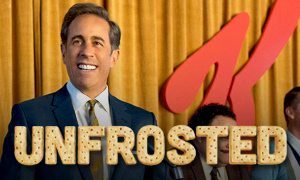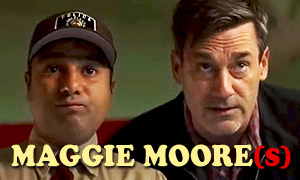Can You Ever Forgive Me?: History vs. Hollywood
| REEL FACE: | REAL FACE: |
Melissa McCarthy
Born: August 26, 1970 Birthplace: Plainfield, Illinois, USA | Lee Israel
Born: December 3, 1939 Birthplace: Brooklyn, New York City, New York, USA Death: December 24, 2014, Manhattan, New York City, New York, USA (myeloma) |
Where did the real Lee Israel grow up?
Had Lee Israel really been a successful biographer?
Yes. Long before the infamous Lee Israel letters, she started her career in the 1960s by working as a freelance writer for magazines, contributing articles on theater, film and television to The New York Times, Soap Opera Digest, and other periodicals. She traveled to California to profile Katharine Hepburn shortly after the death of her longtime companion Spencer Tracy. The piece was published in Esquire in November 1967. Israel's work in magazines continued into the 1970s.
In 1972, she published her first biographical book, Miss Tallulah Bankhead, which focused on the life of the stage and screen actress known for her outrageous personality and husky voice. Her second book, Kilgallen: A Biography of Dorothy Kilgallen, focused on the journalist and regular panelist on the television game show What's My Line? That book made it onto The New York Times Best Sellers List in 1980, the year of its release.
Did a poorly received biography of cosmetics mogul Estée Lauder really send Lee Israel's career into a tailspin?
Yes. Israel addresses this in her memoir Can You Ever Forgive Me? She explains that Macmillan Publishing gave her an advance in 1983 to start the project on Lauder. They wanted it to be an unauthorized biography that didn't hold back in exposing the less-than-savory sides of the cosmetics magnate. According to Israel, Lauder tried to repeatedly pay her off to drop the project. Israel refused and Lauder retaliated by writing her own memoir, which was published in the fall of 1985 to coincide with the release of Israel's biography.
As a result, Israel had to hurry her book, Estée Lauder: Beyond the Magic, to completion. It was trashed by critics and became a failure commercially as well. "I had made a mistake," Israel would later write in her own memoir Can You Ever Forgive Me? "Instead of taking a great deal of money from a woman rich as Oprah, I published a bad, unimportant book, rushed out in months to beat [Lauder's own memoir] to market."
Did Lee Israel end up on welfare?
Yes. After the failure of her 1985 biography on Estée Lauder, her career went into decline and she struggled to make ends meet. "I had never known anything but ‘up’ in my career," she stated in her memoir. Like in the movie, she was overburdened by unpaid bills and a sick cat that needed veterinary care. A 9-to-5 job was out of the question and friends say that she wouldn't have had the temperament for it. “I regarded with pity and disdain the short-sleeved wage slaves who worked in offices,” she wrote in her memoir. “I had no reason to believe life would get anything but better.” In addition to ending up on welfare, the true story reveals that it wasn't long before Israel committed her first criminal act.
What was the first crime that Lee Israel committed?
"[It] happened incrementally, like most evil things do," Israel told NPR in 2008. "I went to the library and was given a bunch of letters, which I should not have been given in a nonsecure area." Instead of returning all of the letters, she kept a few letters written by stage, screen and radio star Fanny Brice. Israel tucked them in her shoes to conceal them and walked out the door. "There was a big white space at the bottom of a letter after 'Yours truly, Fanny Brice.' I got an old typewriter, and I wrote a couple of hot sentences that improved the letter and elevated the price." She sold each one for $40 a piece. It was hardly a windfall, but by 1991 it was enough to help her make ends meet. "For the first time in a long time, I had some jingle in my jeans," she said. It also laid the foundation for her to refine her skills for future forgeries that she sold for slightly more money.
Was the real Lee Israel a lesbian?
Yes. In the Can You Ever Forgive Me? movie, Lee Israel longs for companionship and visits her favorite bookshop often, which culminates in a date with Anna (Dolly Wells) that she ultimately sabotages. Real-life friends of Israel have confirmed that she was homosexual. At the end of her life, she had no children and lived alone.
Is the bookstore owner who develops a romantic interest in Lee Israel based on a real person?
No. The female bookstore owner, Anna (Dolly Wells), is not based on a real person and her brief romance with Lee Israel is fictional. In the movie, Israel (Melissa McCarthy) shuts down a potential romance with Anna almost as soon as it begins, revealing Israel's fear of letting anybody get close to her, and vice versa. The character of Anna is also a catalyst of sorts, since she critiques the letters Israel shows her and unknowingly helps Israel perfect her skills as a forger. -Eye For Film
Was Lee Israel an alcoholic?
Yes. She was an alcoholic who could be nasty at times. “She drank an awful lot — she was an alcoholic,” friend David Yarnell said shortly after her death. “And she was very feisty, and people did not want to work with her.” -The New York Times
What lengths did Lee Israel go to in order to make sure that the forged letters appeared authentic?
The Can You Ever Forgive Me? true story confirms that Lee Israel went to the extreme lengths we see in the movie in order to make sure that her forgeries looked authentic. She obtained old typewriters that were prominent in the era that the letters were supposed to have been written. She kept them in a rented storage locker on Manhattan’s Upper West Side, each typewriter adorned with a tag that included various names — Dorothy, Noël, Eugene O’Neill, Bogart, Louise Brooks. In order to match the age that the paper should be, she went to libraries and removed vintage paper from the back of period journals. As an experienced researcher, she tracked down published letters written by her subjects and extracted characteristics to help her forgeries appear more authentic. This included tracing over the signatures to duplicate onto her forgeries.
“She was brilliant,” commented retired F.B.I. agent Carl Burrell, who worked as the lead investigator on Israel's case. -The New York Times
How many letters did Lee Israel forge?
By her own account, it is estimated that she either stole, altered, or flat out forged more than 400 letters from deceased actors and writers, including Dorothy Parker, Noël Coward, Ernest Hemingway, Louise Brooks, and more. She was one of the most successful forgers in literary history. Israel said that the dealers were "spectacularly incurious," mainly because the content of the letters wasn't overly salacious or hard to believe. -NPR
How much did Lee Israel make off of her forgeries?
Fact-checking Can You Ever Forgive Me? reveals that she didn't make a whole lot off of each letter, normally selling them for anywhere from $50 to $100. The letters mainly consisted of personal opinions and anecdotes that would be attractive to collectors but not the average person. For the most part, this allowed her forgeries to escape the scrutiny of scholars. If she sold roughly 400 letters as she's stated, that would put her max profit no higher than $40,000. It was likely much lower. However, turning the story of her exploits into a bestselling book made her crimes much more lucrative in the end.
What were some of her most notable forgeries?
Carl Burrell, the lead F.B.I. investigator on Lee Israel's case, says that he particularly liked an Ernest Hemingway letter that she forged. "He was complaining about Spencer Tracy being cast as the main character in The Old Man and the Sea." -The New York Times
Some of the Lee Israel letters referenced the sexuality of British playwright and performer Noël Coward, a closeted gay man. Several of them made it into The Letters of Noël Coward, published in 2007. Her Coward letters eventually drew the suspicion of various buyers, who knew that it would have been highly unlikely for Coward to reference his homosexuality in his letters, since homosexuality was a jailing offense at the time.
Soon after, a New York dealer became furious once he learned that the Dorothy Parker letters he'd purchased weren't authentic. He threatened to testify against Israel before a grand jury unless she paid him $5,000. This marked the end of her selling forged letters, as the enterprise had become too risky. However, it didn't stop her from continuing to engage in forgery. -NPR
How did Lee Israel continue to profit off forgery, even after the selling of forged letters put too much heat on her?
Israel returned to what she had done initially, sell original letters that she stole from renowned libraries, including the New York Public Library and the libraries of Harvard, Yale, Columbia and Princeton Universities. Only this time, instead of just stealing the originals, she first studied them, then stole the letters and put forged copies in their place. To keep herself at a distance, she had an ex-con friend sell the originals for her. -The New York Times
Is Lee Israel's alcoholic partner-in-crime, Jack Hock, based on a real person?
Yes. Although, he is only scantily mentioned in Lee Israel's memoir. She describes him as a tall, "wheaten-haired gay man" who was an "old bartending acquaintance." He had been in jail for two years for holding up a taxi driver at knife point while arguing about the fare. Hock was a chain smoker who used a short cigarette holder because he thought it would prevent him from getting lung cancer. Israel describes him as having taken many beatings, which she learned through friends were from hustlers for whose services he had refused to pay. Hock, who was born in Portland (he wasn't British like in the movie), died of AIDS at age 47 in 1994. The actor who portrays Hock in the film, Richard E. Grant, was 59 at the time of filming.
Like in the movie, she describes Jack Hock as helping her fence the stolen letters after the authorities were onto her. He was often able to use his street smarts and charm to negotiate for much more than she originally anticipated getting. -Filmwax Radio
Did a stolen Ernest Hemingway letter really lead to the discovery of Lee Israel's crimes?
Yes. A New York autograph dealer named David H. Lowenherz purchased a lengthy letter written by Ernest Hemingway to journalist Norman Cousins. Things appeared on the level until Lowenherz discovered that the letter belonged to Columbia University's collection. He got in touch with the university, and it was then that the forgery was discovered in their collection. They looked at the access cards to see who had recently signed to be given access to the letter. A familiar name appeared, Lee Israel. -Town & Country
The FBI stepped in and recovered many of the stolen letters, in addition to Lee Israel's forgeries. However, as of 2015, the agent in charge believed that more letters remained undiscovered. -The New York Times
What was Lee Israel's punishment?
Lee Israel's letters didn't result in her facing any jail time. In 1993, she plead guilty to a single count of conspiracy to transport stolen property across state lines for profit. She was given six months house arrest and five years probation. The court instructed that she attend an alcohol treatment program. "I never did," she wrote in her memoir. In addition to the ramifications brought by the court, many libraries barred her from entering. -The New York Times
How long did Lee Israel's criminal career last?
Lee Israel's criminal career spanned just three years of her life. However, it is what she has become best known for, in part due to the book she wrote, Can You Ever Forgive Me?, which highlights her crimes. -Town & Country
What did Lee Israel do after she was exposed as a forger?
Israel found work as a copy editor for Scholastic magazines. She also went on to write her fourth book, her memoir Can You Ever Forgive Me?, which focuses on her exploits as a literary forger. It would be her final book. What did Lee Israel consider to be her finest achievement? "I still consider the letters to be my best work," she said in her memoir.







